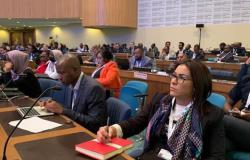by Ahmad Ghaddar, Alex Lawler and Maha El Dahan
LONDON/DUBAI, June 2 (Reuters) – The Organization of the Petroleum Exporting Countries (OPEC) and its allies, united within OPEC+, agreed on Sunday to extend most of their agreements to cut crude production until 2025, beyond what the market anticipated, in order to support prices in a context of sluggish global demand and competition from supply from the United States.
The barrel of oil is currently trading around $80, a price considered insufficient by many OPEC+ members to balance their budget.
OPEC and its allies, the main one being Russia, have decided since the end of 2022 to cut their production to raise oil prices. They are currently reducing it by 5.86 million barrels per day (bpd), or around 5.7% of global demand.
A first part of this reduction concerns 3.66 million bpd and was due to expire at the end of 2024. A second part consists of voluntary reductions by eight members of OPEC+ covering 2.2 million bpd until the end of June 2024.
The OPEC+ countries agreed on Sunday to extend the first part by one year, until the end of 2025, and the second by three months, until the end of September 2024.
This second part of the supply reduction will then be gradually phased out over a year, between October 2024 and the end of September 2025, three OPEC+ sources said.
“The market now has visibility for almost a year and a half,” said an OPEC+ delegate, speaking on condition of anonymity.
The countries making voluntary reductions totaling 2.2 million bpd are Algeria, Iraq, Kazakhstan, Kuwait, Oman, Russia, Saudi Arabia and the United Arab Emirates.
Sunday’s meeting lasted less than four hours, an unusually short time despite the complexity of the agreement to be reached.
According to OPEC+ sources, Saudi Arabia, the largest producer and de facto leader of OPEC, worked behind the scenes during the days preceding this meeting to bring all positions together.
(Opep Office, written by Dmitry Zhdannikov, French version Claude Chendjou and Bertrand Boucey)






